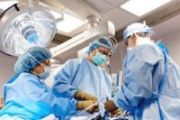SIRS Trial: High Dose IV Steroids May Harm, Not Help Patients Who Undergo Cardiopulmonary Bypass Surgery
Treatment with methylprednisolone was associated with increased risk of myocardial infarction in high-risk patients 30 days after bypass surgery.

Many medical facilities routinely administer intravenous steroids to patients undergoing cardiac procedures with cardiopulmonary bypass. Inflammation can result from the surgical insult and from the cardiopulmonary bypass itself, and steroids are meant to mitigate the harm from the inflammatory cascade. Strong evidence from randomized controlled clinical trials had not existed to support this practice, however, although up to 25% of facilities worldwide use steroids for heart surgeries done under bypass.
Investigators from the Steroids in Cardiac Surgery (SIRS) Trial provided evidence to show that high-dose IV steroids may harm rather than help such patients, and should not be used prophylactically. Richard Whitlock, MD, associate professor of cardiac surgery at McMaster University and a lead investigator of the SIRS study, presented these findings during the American College of Cardiology 2014 Scientific Session in Washington, DC.
For the study, 7,507 patients were randomized to receive steroid treatment (500 mg IV methylprednisolone administered intraoperatively), or placebo (also administered intraoperatively). Only one patient was lost to follow-up, although 105 patients in the steroid arm and 106 patients in the placebo arm did not receive the drug.
Co-primary outcomes at 30 days were total mortality and a composite outcome of death, MI, stroke, new renal failure, and respiratory failure. Analysis was performed for each component of the composite outcome, as well.
The first co-primary outcome, all-cause mortality at 30 days, did not differ significantly between the treatment arms: 4.1% of patients on steroids vs. 4.7% of the placebo group died (P = .23). Similarly, the composite co-primary outcome was similar between groups, with events occurring for 24.3% the steroid group, compared with 23.3% for the placebo group (P = .31).
Although there was no statistical significance between the two treatment arms at 30 days for the co-primary outcomes, examining the components of the composite primary outcome revealed something surprising: The rate of MI, defined by release of myocardial band creatine kinase (CK-MB) was significantly higher for the steroid group than for the placebo group (13.3% vs .10.9%, P< .001). Primary outcomes held across subgroup analysis, which included variables such as sex, presence of diabetes, type of surgery, and duration of cardiopulmonary bypass.
Secondary safety outcome analysis, importantly, revealed that higher peak blood glucose levels were present in the steroid group; further, this group had higher insulin requirements postoperatively. These differences were significant: mean peak plasma glucose levels were 12.7 mmol/L vs. 12/1 mmol/L ( P = .04), while mean total postoperative insulin requirements were 50.3 U for the steroid arm and just 32.6 U for the placebo group (P< .00001).
These findings, Whitlock said, may they give a clue as to the potential role high-dose IV steroid administration may play in contributing to postoperative myocardial infarction. Research done much earlier had suggested that an important component of healing of the myocardium was that glucose could be driven into the cells for early cell repair. Higher plasma glucose levels in the steroid group, together with higher insulin requirements, suggest the glucose may not be entering the myocyte to begin this early healing.
Amit Khera, MD, of the University of Texas Southwestern’s Medical Center, put the findings into context during a press conference following the clinical trial session. He called the SIRS trial the “definitive study” for methylprednisolone in high doses during cardiac surgery on bypass, and held it up as an example of a large and well-constructed study that answers an important clinical question. The results should clarify and inform clinical practice for cardiac surgery on bypass worldwide, he said. Given the risk of MI for these patients, “This should not be a strategy we will pursue.”